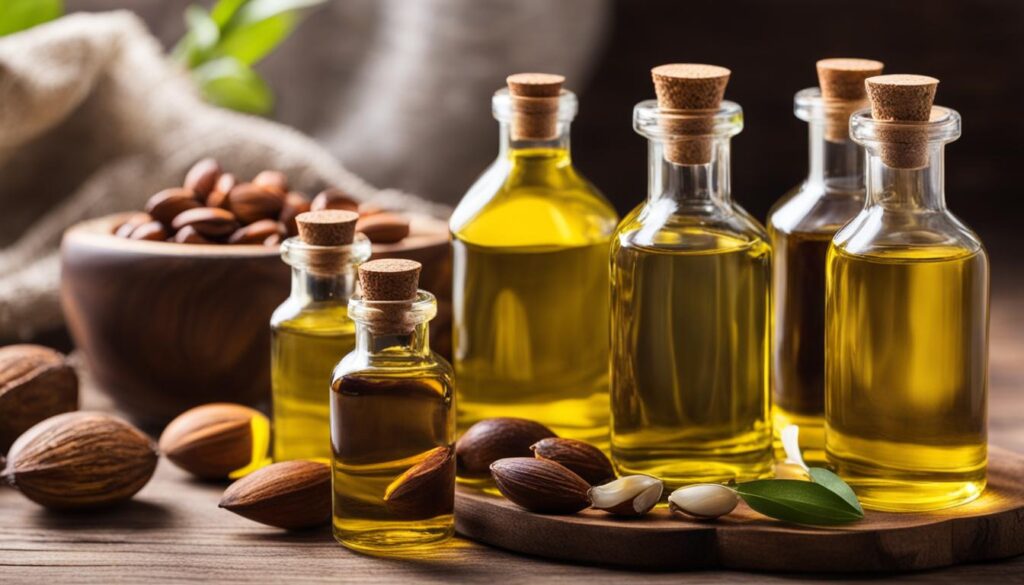If you’re an enthusiast of personal wellness routines, you may be familiar with carrier oils and their benefits. One such oil that has gained popularity in recent years is castor oil. But can you use castor oil as a carrier oil? Let’s explore the uses and benefits of castor oil in personal wellness.
Derived from the castor oil plant, Ricinus communis, castor oil is cold-pressed from its seeds, resulting in a versatile oil with numerous applications. When it comes to carrier oils, castor oil can be a great addition to your arsenal.
Key Takeaways:
- Castor oil can be used as a carrier oil in personal wellness routines.
- It should not be ingested without consulting a doctor.
- It can be used for massage, skincare, and haircare.
- Castor oil can be combined with essential oils for aromatherapy and added to bath water for a hydrating experience.
- Choose the right carrier oil based on individual needs and preferences.
Benefits of using castor oil as a carrier oil
Using castor oil as a carrier oil provides various benefits. It is rich in fatty acids and has antioxidant and anti-inflammatory properties. Castor oil can:
- Relieve pain from muscle aches and joint pain
- Soothe itching, swelling, and inflammation
- Fight acne-causing bacteria
- Clear congestion and boost circulation
- Soften and hydrate the skin and hair
- Balance hormones and eliminate toxins
- Have cleansing and emollient properties
Castor oil is known for its effectiveness in promoting hair growth, reducing the appearance of aging such as wrinkles and fine lines, and moisturizing and soothing the skin. It can also be used for overall health by relieving skin inflammation, soothing sore muscles, disinfecting wounds, and reducing cellulite.
With its exceptional properties, castor oil serves as a versatile carrier oil that can enhance the benefits of other essential oils and provide numerous advantages for personal wellness.
How to Use Castor Oil as a Carrier Oil
Castor oil, a versatile and natural oil, can be used in various ways as a carrier oil. Whether you’re looking for a soothing massage, a hydrating treatment for your skin and hair, or even a bug repellent, castor oil has got you covered. Here are some simple and effective ways to incorporate castor oil into your personal wellness routine:
- Massage Oil: Use castor oil by itself or dilute it with a few drops of essential oils for a relaxing and rejuvenating massage experience.
- Skincare and Haircare: Apply castor oil directly to your skin or hair for hydration and nourishment, or mix it with your favorite skincare and haircare products.
- Hydrating Bath: Add a few tablespoons of castor oil to warm water to enjoy a moisturizing and soothing bath.
- Bug Repellent: Combine castor oil with essential oils known for their bug-repelling properties, such as citronella or eucalyptus, and apply it to your skin to stay protected against pesky insects.
When using castor oil as a carrier oil, it’s important to choose the cold-pressed and unrefined variety for maximum benefits. Castor oil that is cold-pressed retains more of its natural nutrients and is free from harmful chemicals and additives.
“Castor oil, a versatile and natural oil, can be used in various ways as a carrier oil.”
So go ahead and reap the benefits of castor oil by incorporating it into your personal wellness routine. Whether you’re indulging in a luxurious massage, pampering your skin and hair, or keeping those bugs at bay, castor oil is a reliable and effective choice as a carrier oil.
History and Origin of Castor Oil
Castor oil has a long and fascinating history, dating back centuries. It has been used for various purposes and hailed for its numerous benefits. Traditionally, castor oil was employed for birth control, treating leprosy and syphilis, and as a remedy for a wide range of health issues.
The castor plant, Ricinus communis, is native to the Mediterranean, East Africa, and India. Throughout history, the oil-rich castor seeds, or beans, have been utilized in the production of paints, lubricating oils, varnishes, cosmetics, and soaps. The versatility of castor oil has even been noted in ancient Egypt, where it was used to light lamps. Castor oil has been found in tombs dating back to 4000 B.C.
To provide a visual representation of the historical significance of castor oil, please take a moment to view the image below:

Different Types of Carrier Oils
When it comes to carrier oils, there is a wide variety to choose from. Some of the most popular types include:
| Carrier Oil | Characteristics | Therapeutic Properties |
|---|---|---|
| Olive Oil | Heart-healthy properties, light texture | Moisturizing, soothing, and antioxidant |
| Coconut Oil | Moisturizing, antibacterial | Skin and hair hydration, promotes wound healing |
| Jojoba Oil | Closely resembles natural oils produced by the body | Moisturizing, anti-inflammatory, soothes skin conditions |
| Argan Oil | Anti-aging properties | Moisturizing, nourishing, promotes hair and scalp health |
| Avocado Oil | Thick, luxurious texture | Intensely moisturizing, rich in vitamins and fatty acids |
Each of these carrier oils has its own unique characteristics and therapeutic properties. Whether you’re looking for a light-textured oil for massage or a deeply hydrating oil for skincare, you can find a carrier oil that suits your needs.

Why Choose Carrier Oils?
Carrier oils are essential in aromatherapy and natural skincare as they dilute and carry the potent properties of essential oils. They provide a nourishing base that enhances the absorption and efficacy of essential oils. While essential oils are highly concentrated and can be irritating on their own, carrier oils help to deliver their benefits safely and effectively. With their unique properties and therapeutic qualities, carrier oils play a vital role in creating customized blends for various wellness practices.
Selecting the right carrier oil
When using essential oils, it is important to choose the right carrier oil to mix them with. Each carrier oil has its own unique properties that can impact the effectiveness of the essential oil. Here are some key factors to consider when selecting a carrier oil:
- Research the properties: Before making a selection, research the specific properties of carrier oils. Consider their consistency, smell, absorption rate, and therapeutic benefits. This will help you choose one that complements your desired essential oil.
- Avoid common oils: While some people may think common oils like baby oil or mineral oil can be used as carrier oils, it is best to avoid them. These petroleum-based oils do not have the same enhancing effects on essential oils as natural carrier oils.
- Opt for natural carrier oils: Choose carrier oils like olive oil, coconut oil, jojoba oil, castor oil, or argan oil for optimal results. These oils are derived from natural sources and have their own therapeutic properties that can enhance the benefits of essential oils.
- Consider scent compatibility: Some carrier oils have a stronger scent than others. If you prefer a carrier oil with a more neutral scent, opt for oils like jojoba or fractionated coconut oil. On the other hand, if you want to add a specific aroma to your blend, consider using an oil with a compatible scent.
- Allergies and sensitivities: Take into consideration any allergies or sensitivities you may have. Some carrier oils may cause allergic reactions or skin irritations in certain individuals. It’s always a good idea to do a patch test before using any new carrier oil.
By taking these factors into account, you can make an informed decision when selecting the right carrier oil for your essential oils. Remember that personal preferences and desired effects may vary, so it’s important to choose a carrier oil that aligns with your specific needs.
Conclusion
Castor oil is a versatile and beneficial carrier oil that can enhance your personal wellness routine. Whether you’re looking to improve your skincare, indulge in aromatherapy, or nourish your hair, castor oil has got you covered. Its moisturizing and healing properties make it an excellent choice for massage, providing soothing relief to your skin and muscles.
As a carrier oil, castor oil can be combined with essential oils to create customized aromatherapy blends. This allows you to experience the therapeutic benefits of both castor oil and your favorite essential oils, promoting relaxation and boosting your overall well-being.
Additionally, adding castor oil to your bathwater can provide a hydrating and indulgent experience, leaving your skin feeling soft and nourished. Its rich history and wide range of uses make castor oil a valuable addition to any personal wellness routine.
When selecting a carrier oil, consider your individual needs and preferences. Castor oil’s unique qualities, such as its moisturizing and healing properties, make it a popular choice for skincare, haircare, and aromatherapy. So, why not harness the benefits of castor oil and enhance your personal wellness journey?
FAQ
Can castor oil be used as a carrier oil?
Yes, castor oil can be used as a carrier oil in personal wellness routines. It is derived from the castor oil plant and is cold-pressed from its seeds.
What are the benefits of using castor oil as a carrier oil?
Castor oil has antioxidant and anti-inflammatory properties. It can relieve pain, fight acne-causing bacteria, clear congestion, boost circulation, and soften and hydrate the skin and hair. It can also balance hormones, eliminate toxins, and has cleansing and emollient properties.
How can castor oil be used as a carrier oil?
Castor oil can be used for massage by itself or diluted with essential oils. It can also be used for a hydrating skin and hair treatment, added to skincare and haircare products, or used in a bath. It can also be combined with essential oils and used as a bug repellent.
What is the history and origin of castor oil?
Castor oil has been used for centuries for various purposes. The castor plant is native to the Mediterranean, East Africa, and India. The oil-rich castor seeds have been used for paints, lubricating oils, varnishes, cosmetics, and soaps. It has also been used in ancient Egypt for lighting lamps and has been found in tombs dating back to 4000 B.C.
What are the different types of carrier oils?
Some popular carrier oils include olive oil, coconut oil, jojoba oil, argan oil, and avocado oil. Each carrier oil has its own unique characteristics and therapeutic properties.
How do you select the right carrier oil?
When using essential oils, it is important to choose the right carrier oil to mix them with. Each carrier oil has its own unique properties. It is advisable to do some research to select the appropriate carrier oil for the desired benefits.
Are there any other considerations when using castor oil as a carrier oil?
It is important to ensure that the castor oil is cold-pressed and to choose the unrefined variety for maximum benefits. Petroleum-based oils are not recommended as carrier oils for essential oils.
What are the overall benefits of using castor oil as a carrier oil?
Using castor oil as a carrier oil provides various benefits for the skin, hair, and overall health. It offers moisturizing, soothing, and healing properties. It can be combined with essential oils for aromatherapy and added to bath water for a hydrating experience.




